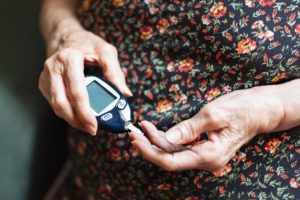 Recent research suggests that type 1 diabetics are more likely to break or fracture a bone when their blood sugar levels are high. The researchers looked at 47,000 diabetics, including both type 1 and type 2 patients.
Recent research suggests that type 1 diabetics are more likely to break or fracture a bone when their blood sugar levels are high. The researchers looked at 47,000 diabetics, including both type 1 and type 2 patients.
Type 1 diabetes is less common and is often present in young people as a result of the pancreas being unable to produce insulin. Type 2 diabetes is associated with poor lifestyle habits like being overweight and unhealthy eating.
Advertisement
During the study period, 672 patients with type 1 diabetes and 8,859 type 2 diabetics experienced bone fractures.
The risk of type 1 diabetics experiencing a bone fracture was 39 percent higher when their average blood sugar levels were dangerously high. Moderately high blood sugar levels did not seem to impact bone fracture risk. This risk was not seen among type 2 diabetics.
Dr. Francesc Formiga of Barcelona University explained, “People with high levels of sugar should be aware that it is not good for their global health or for their bones and may increase the risk of fractures, therefore they should modify their treatment, according to the recommendations of their doctors.”
Although it has been long known that diabetics have a higher risk of fractures, the role which blood sugar plays is not fully understood.
Complications of diabetes may contribute to bone fractures, such as cognitive impairment and nerve damage, which can diminish sensation in the extremities. Retinopathy is another complication that could cause more bone fractures, as it makes it difficult to see obstacles.
In the study, type 1 diabetics with retinopathy were 29 percent more likely to experience a bone fracture. Patients with kidney failure also had a heightened risk of fractures.
Advertisement
Dr. James Richardson at Michigan Medicine added, “Fall risk is markedly increased in people who cannot successfully respond to a postural perturbation (such as a trip or slip, ankle turn) in the roughly 400 milliseconds available to do so. This requires rapid and precise information that ‘reports’ the perturbation. This comes, primarily, from precise sensation in the feet and ankles and excellent visual acuity.”
The study stresses the importance of blood sugar management and control, particularly among type 2 diabetics.
Also read:
